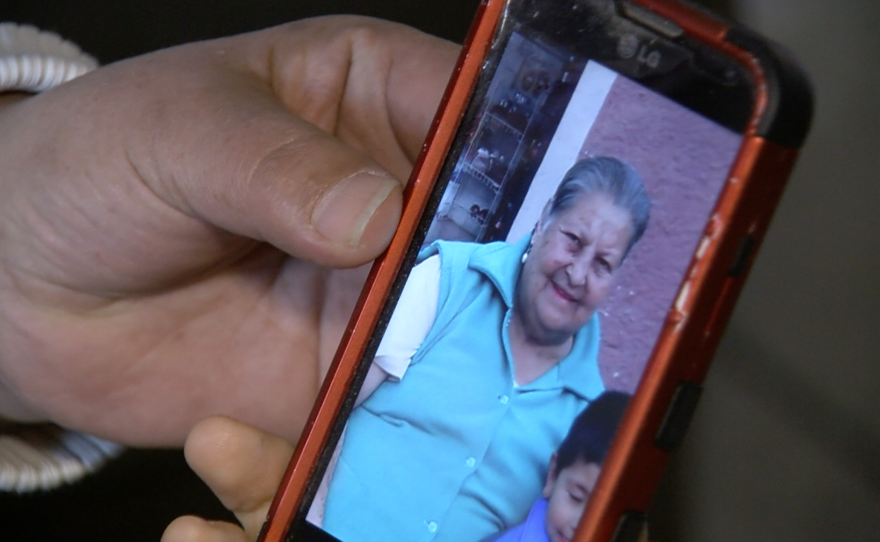This is KPBS Midday Edition. I'm Maureen Cavanaugh. Mexican-Americans and Mexican nationals living in the US send a record $27 billion to their families last year. The surge was due in part to fears about President Trump's threats to target that money known as remittances. Fronteras reporter Jean Guerrero has the story. Teresa Gomez works at a grocery store organizing merchandise. She was there's a third of every paycheck for her aging mother who lives in Mexican state of Jalisco. I'm the one who provides for my mom. I take care of her, I help her buy food and pay for the doctor. Her mother has heart problems and lacks insurance. She sends her about $400 every month. Gomez is one of millions of immigrants who sends money to meet family -- family. Some people use larger transfer companies like Western Union. Last year remittances searched to an all-time record of $27 billion. California sent $8 billion. The surge is due in part to President Trump's threats to tie government insists is a way of forcing Mexico to fake -- pay for his board wall which would cost anywhere between 5,000,000,020 $5 billion. Abandon remittances would have to be broadly applied. It would be attacks on electronic transfers. The thing is what's the difference between an electronic transfer that is a written that -- remittance versus the transfer between two business entities. On paper they look identical. As a result, he says it would not just heard people in the country illegal but San Diego entirely. You look at construction industry, bars and restaurants, the tourist industry. To into any San Diego neighborhood and who is caring for yards, cleaning houses. Gomez is US and Mexican citizen. She lives in a small apartment with her bird. She says Trump worries her. How are you going to punish so many citizens who come as workers with good thoughts and act in this country. She said she would find a way to send money to matter what. As a human being or rather as a Mexican, nothing is impossible. She could cross the border to Tijuana to transfer the money. For immigrants who live far from the border or who lack legal status it's more complicated. Marina is an immigrant who asked us to keep our identity secret. She cleans houses and takes care of a two-year-old girl. Marina also supports her mother in Mexico. She sends money every month for medicines and food. I never go out. It's rare for me to go watch a movie or each with a friend. Almost always I am working. She says Trump's threats scare her because her mother depends on her. She's afraid of going back to Mexico where homicides rose by 22% last year. When I talk to my family they tell me every day that it's worse. They are afraid to go out into the street, they killed someone there. She said if Trump wants to build a wall he should do it. I respect the new president, this is simply not my nation. She hope Trump finds another way to pay for it, she cannot afford it. Jean Guerrero KPBS news. Jean Guerrero joins us now. Welcome. Do we have any idea how President Trump's administration would go about targeting remittances to Mexico? Has there been any policy put forth on how much the tax would be? No. As for specifics, there aren't very many. All we know is based on some memos that he put out during the campaign. We don't even know that this scenario will unfold. He has floated various ideas for how we would make X ago pay for the wall, taxing imports, repealing NAFTA, targeting remittances seems to be the most realistic although it would have an enormous impact. In one of the memos he says he would change a rule under the Patriot Act, to cut off funds specifically from immigrants who can't prove legal status. He said most of the remittances sent are from people in the US illegally. I should say that studies have shown that's not necessarily the case. We don't have the exact figures. It's unclear how the rule would work in that it would have to change the operations for money transfers for anyone sending money to Mexico. How did you meet the two women in your piece? Gomez, I had met her before four and article -- before her for an article. She was initially reluctant because she is shy and doesn't like to be on camera. She has both US and Mexican citizen. She wasn't the hardest source to get. I wanted to find someone who specifically, did not have legal status I sent out a request among many sources. I was in contact with people who sent remittances and did not have legal status, they did not want to talk on the record. That's one thing I have been finding a lot since President Trump is elected. A lot of people who were previously very open about talking to journalists, even talking openly about not having legal status, they have become more reluctant and pulling back. If they have lawyers, they are recommending they stay in the shadows. Nobody knows how the president's immigration policies are going to unfold. This woman ended up agreeing after several conversations and realizing I would protect her identity. From your report, this proposed policy seems to hit the most vulnerable people, not only in this country but Mexico. How much feared do you sense and the people you have spoken with about this possible policy? I don't think I can do justice to the amount of fear that I sense in them. Particularly the cause remittances are huge for Mexico and it's the number one source of foreign income for the country, after auto exports. This would have an enormous impact. People are so afraid they don't want to give interviews. Some, like the two women I spoke with have spent their whole lives in the United States with the mere -- the intention of just sending money to Mexico. That's their only reason for being here. If remittances are targeted, it's women who will feel the consequences. Women and children in rural Mexico who receive remittances from their husbands in the United States. Thereof vulnerable people on both sides of the border. One of the woman said she will find a way to send the money no matter what. Is that Defiance also reaction that people are having? Yes. That's what I've been seeing. They tell me no matter what happens they will find a way to send the money. They will pay somebody to take the cash across the border or if they have the means they will cross themselves as often as they need to. It will be making -- it would make people's lives more complicated. How are you planning to follow up this report? I will be paying very close attention to Trump's announcements on how he intends to get Mexico to pay for the wall. I will see what developments occur and stay in close contact with the people who send money back. I've been speaking with reporter Jean Guerrero from the KPBS Fronteras Desk. Thank you so much.
Fifty-year-old Teresa Gomez moved to the United States as a young woman with one goal: to support her aging mother in Mexico.
For decades, Gomez has sent her mother a third of every paycheck. She organizes merchandise and attends customers at a Barrio Logan grocery store. Her mother has heart problems, and uses the money to survive in the southern Mexican state of Jalisco.
“I send her $400 every two weeks,” said Gomez, who has dual U.S.-Mexico citizenship. “I provide for my mother.”
But that money – known as remittances – may soon be in jeopardy. President Donald Trump has threatened to target remittances as a way of forcing Mexico to pay for his planned border wall, which will cost anywhere between $5 billion to $25 billion.
Gomez doesn’t think that would be fair. She’s a U.S. citizen as well as a Mexican one.
“How are you going to punish so many citizens who come as workers, with good thoughts and acts in this country?” Gomez asked.
Remittances to Mexico reached a record $27 billion last year, representing the largest source of foreign income for the country after auto exports. Immigrants in California sent the largest chunk, $8 billion.
Gomez, a single woman, said she wouldn’t be able to afford a tax on remittances. She rents a small room in a Barrio Logan apartment, where she lives with her talkative conure parrot, Kiko.
“We came here with the American dream, not to be millionaires, but simply to live decently and help our families,” she said.
Gomez is one of millions of Mexicans in the U.S. who send money to relatives south of the border. She sends the money through a small money-transfer shop, El Frijolito, which charges a fee of $5 or $10, depending on the desired exchange rate. Others use larger transfer organizations such as Western Union.

The recent surge in remittances was due in part to fears about Trump’s threats. The owner of El Frijolito, Mariceli Castro, said money transfers surged the day after Trump became president.
“The lines were all the way to the door, people were sending large quantities of money, a lot of people were selling everything they had in the bank,” Castro said.
She said if Trump targets remittances, it would be devastating for her business and her clients.
“Most of (my customers) have an honest job, earning money with the sweat of their foreheads just so they can send it home,” Castro said.
Targeting remittances may be trickier than Trump has outlined in his campaign memos. Policy experts have said that a tax on remittances would unnecessarily hurt all money transfers to Mexico, including those by Americans.
“It would have to be broadly applied – it would be, basically, a tax on electronic transfers,” said Gordon Hanson, dean of UC San Diego’s School of Global Policy and Strategy. “The thing is, what’s the difference between an electronic transfer that is a remittance versus a transfer between two business entities? On paper, they look identical.”
Hanson said a tax or ban on remittances would be devastating for Mexican-Americans and the San Diego economy in general, not just people who are in the U.S. illegally.

“You look at our construction industry, you look at bars and restaurants and hotels so the San Diego tourist industry, go into any San Diego neighborhood, who is caring for yards, who is cleaning houses and providing child care?” he said.
Gomez said she will find a way to send her mother the money she needs for medicines and food – no matter what.
“As a human being, or rather, as a Mexican, nothing is impossible,” she said.
If need be, Gomez could cross the border to transfer the money in Tijuana. She would have to contend with three- to four-hour wait times at the ports of entry, but she said it would be worth it.
For immigrants who live far from the border, or who lack legal immigration status in the U.S., it’s more complicated.

Marina is a 37-year-old immigrant who asked us to keep her identity secret for fear of deportation. She cleans houses and takes care of a two-year-old girl, sending about $500 a month to her mother in Mexico City. She is also single.
“I never go out – it’s rare for me to go watch a movie or eat with a friend because I’m always working,” she said.
She said she moved to the U.S. when she was 21 years old, in 1999, to support her mother, and that Trump’s threats scare her because her mother depends on her. She said she is afraid of going back to Mexico, where homicides rose by 22 percent last year.
“When I talk to my family, they tell me every day it’s worse. They’re even afraid to go out into the street because they killed someone here, they killed someone there,” she said.
She said if Trump wants to build a wall, he should build one – but she hopes he finds another way to pay for it, because she can’t afford it.
“I respect the new president because this is simply not my country,” she said. “But I’m not robbing money as some people say. I work.”







